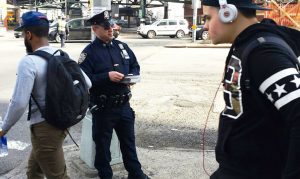
A new report says the United States needs to expand community policing efforts to fight violent extremism at home—and to keep those efforts separate from police counter terrorism programs.
Building trust with Muslim-Americans will be a key challenge, according to the analysis.
“ONCE TRUST IS ESTABLISHED, COMMUNITIES CAN WORK WITH POLICE TO BUILD RESILIENCE AGAINST EXTREMISM.”
“One of the best ways to prevent violent extremist attacks is for the police to develop trusted and deep relationships with the communities they serve,” says the report’s lead author David Schanzer, an associate professor at the Sanford School of Public Policy and director of the Triangle Center on Terrorism and Homeland Security at Duke University.
“Once trust is established, communities can work with police to build resilience against extremism and identify threats to public safety.”
Muslim-Americans interviewed for the report said they have suffered widespread discrimination and harassment since 9/11 that has increased with the rise of ISIS. They resent that police terrorism prevention efforts appear to be directed only at Muslims and are suspicious of police intentions, the study finds.
The report assesses the Obama administration’s national strategy for using community policing approaches to prevent violent extremism.
The findings are based on a survey of law enforcement agencies, as well as hundreds of hours of interviews with police departments and community members in eight cities. The report is sponsored by the National Institute of Justice, the research arm of the US Department of Justice. It includes recommendations for the federal government, for police agencies, and for Muslim-American communities.
“Community members are natural allies for law enforcement, if they are approached in a consistent, nondiscriminatory way,” says coauthor Charles Kurzman, professor of sociology at the University of North Carolina at Chapel Hill. “To reduce the perception of discrimination, and to prevent violent extremism across the board, law enforcement should consider outreach initiatives for all communities that are being recruited for violent extremism, not just Muslim communities.”
Although preventing violent extremism is a pressing national issue, it is not a top priority for local police who must also address violent crime, drugs, gangs, and other public safety concerns with limited budgets, the authors found. Most agencies do not have a full-time officer dedicated to community engagement.
“Our research shows that the most effective way for police departments to build strong relationships is through a holistic outreach program that focuses on all of the subsets of the community they serve, not just a particular group, and the entire range of public safety issues, not just violent extremism,” says coauthor Jessica Toliver, director of technical assistance for the Police Executive Research Forum.
5 RECOMMENDATIONS
1. Separate community outreach and engagement programs from police units that collect intelligence and conduct criminal investigations. Police officers cannot expect to be welcomed to community events and be considered a partner in addressing public safety concerns if the same officers are collecting information that is fed to criminal investigators.
2. Police agencies should recruit and hire a workforce that reflects the racial, ethnic, and religious composition of their community.
3. The federal government should provide long-term funding directly to police departments to support outreach and engagement personnel.
4. The federal government should redouble efforts to prevent discriminatory treatment, profiling, and harassment of law-abiding citizens at airports and immigration checkpoints.
5. The federal government’s “Countering Violent Extremism” terminology, adopted in 2011, is disliked by both police departments and communities and should be abandoned. As an alternative, the report authors suggest the term COMPLETE Public Safety (Community Partnerships with Law Enforcement to Enhance Public Safety).
Source: Duke University and Futurity.org





Until the police are willing to accept “civilian”/community/99% oversight, there will be no trust of the police unless the civilian/community/99% have no choice except calling the police. The police need to accept the fact that their mission is more about social interaction with the public than military operations. Ask almost any police person how they feel about a civilian review board with subpoena and real investigatory power and you will see that they don’t think of themselves as an entity that should answer to “the people”. This country needs real police, not gestapo type killer-commandos. And that often describes the police – especially in poor and minority communities.